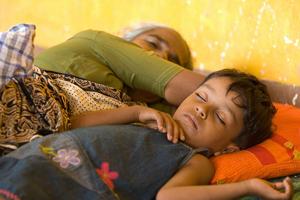
A grandmother and her granddaughter, displaced by fighting in the city of Muthur further south, sleep at the Hindu Cultural Center in Trincomalee. Caritas has been supporting IDP’s with a wide range of services, but many, like these, remain unable to return home, and now face an uncertain future.
Credits: Caritas
The monsoon season will be arriving in Sri Lanka shortly. No one knows how powerful the winds and rains will be, but one thing is certain – it’s best to not be living in a tent when they arrive.
Tens of thousands of people are still living in temporary shelters following the end of Sri Lanka’s civil war in May last year and over 350,000 people are without homes in general.
“About 60-70,000 people are still in camps,” says Fr George Sigamoney, director of Caritas Sri Lanka, on a visit to Caritas Internationalis in Rome. “They haven’t gone back home because their lands haven’t been cleared of landmines.”
“People who are getting back to their lands sometimes still don’t have proper shelter, just a covering and poles – and it’s not easy to put up a house with that,” he says.
People who are being resettled are mainly in the north, where the final battle in the war took place. Fr George says life on their return isn’t easy. Beyond shelter, they have to find transportation such as bicycles so they can work and also they have to deal with the ongoing psychological effects of the 25-year-plus civil war.
“People haven’t totally recovered from trauma and this will take time. We’re giving psychosocial support and counselling. A lot of our religious sisters and trained people are involved in this kind of work,” says Fr George.
Now the emergency phase of the Sri Lanka crisis is over, Caritas has been looking at how best to meet the long-term needs of those returning to their homes.
“Now people are moving from camps and back to their lands we’re looking at how we can support their need for more permanent housing and also how they can get back their livelihoods,” says Fr George.
Caritas’ emergency appeal runs for the whole of 2010 and will help tens of thousands of people with food, shelter, livelihoods, psychosocial support and education.
The participation of the community will be key to the project’s success. Community members will work alongside Caritas in programming, including beneficiary selection, shelter design and self-construction, livelihood activity planning, community education, participation in activities designed to help recover from emotional trauma, as well as monitoring and evaluation of the program’s progress.
Fr George points out that this was all possible because what Caritas supporters generously donated covered all of the needs planned for 2010. However, he doesn’t know how much support Sri Lanka will receive in the long-term
“Sri Lanka seems to be no longer a priority now the war is over, but it is and we request continuous support so we can ensure our commitment to Sri Lanka’s people,” says Fr George.
